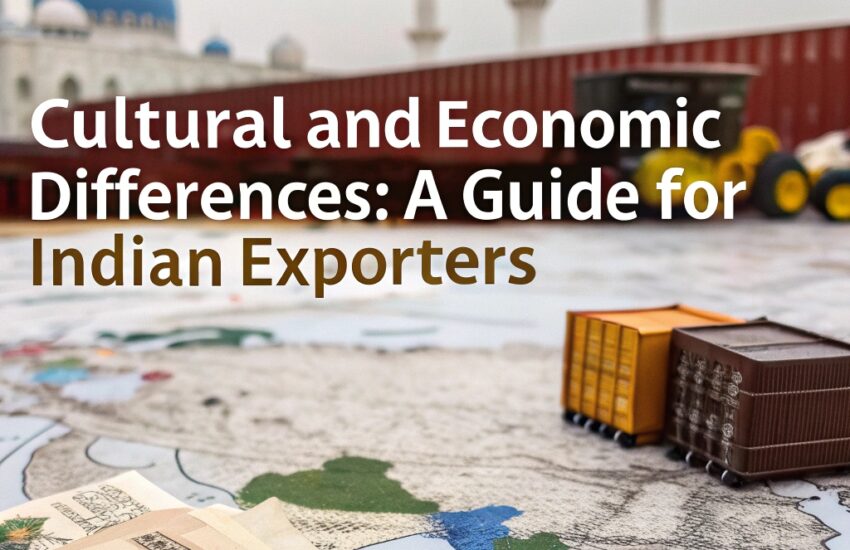In today’s globalized economy, companies like yours must navigate diverse cultures and markets to stay competitive.
As an exporter in India, you’re likely aware of the vast potential in the Middle East – particularly in Saudi Arabia. However, you may also be aware that this market is fraught with cultural differences, regulatory complexities, and security concerns.
In order to successfully enter the lucrative Saudi Arabian market and capitalize on its huge demand for your product or service.
This comprehensive guide will walk you through key aspects of doing business in Saudi Arabia, from understanding local customs and regulations to finding profitable export opportunities.
Getting to Know the Kingdom’s Economic Landscape
Navigating Cultural and Economic Differences in Saudi Arabia requires a deep understanding of its economic landscape. The country’s economy is primarily driven by oil, with a large portion of government revenue coming from petrochemicals exports.
In recent years, the Saudi Arabian government has made efforts to diversify the economy through initiatives such as “Vision 2030”. This plan aims to reduce reliance on oil exports and create new opportunities in sectors like tourism, IT, and manufacturing. However, this shift also means that exporters need to be aware of changing trade regulations.
The kingdom’s economic landscape is characterized by a unique blend of traditional trading practices and modern business approaches. Local businesses often rely heavily on personal relationships to seal deals, so exporters should expect to build strong ties with partners before closing a sale. Cultural differences in communication styles can also lead to misunderstandings if not addressed – directness and assertiveness are valued in Saudi Arabian culture but may be seen as aggressive or confrontational elsewhere.
To succeed, you’ll need to develop an understanding of the local business environment, including its strengths and weaknesses. Focus on building relationships with key stakeholders, such as government officials and established trade organizations. Be prepared to adapt your sales approach to meet the needs of Saudi Arabian customers and be willing to navigate complex regulatory requirements.
Navigating Cultural Differences in Business Etiquette
When entering Saudi Arabia as an Indian exporter, it’s essential to grasp local customs and expectations to build trust with clients and colleagues. Building trust is paramount in Saudi Arabian business relationships.
In Saudi Arabia, formal settings like mosques or government offices require a specific protocol when interacting with locals. For instance, men are expected to remove their shoes before entering these buildings as a sign of respect. This custom may not be as apparent for foreign visitors who are accustomed to removing their shoes at home or in more relaxed environments.
The consequences of failing to comply can be significant. Take John’s company, which faced a diplomatic incident when his colleague neglected to remove her shoes during an important meeting in Riyadh, resulting in cultural misunderstandings that strained their business relationship. This experience highlights the importance of understanding local customs and adapting one’s behavior accordingly.
According to research by Euromonitor International, 71% of expats report that grasping local customs has improved their relationships with locals. While there might not be an expectation for women to remove their shoes in all situations, being mindful of this custom can help build rapport with male colleagues or clients. For instance, a woman who takes the time to learn about the importance of shoe removal in Saudi Arabian culture may find that her male counterparts are more inclined to engage with her.
By taking the time to understand and respect local customs, businesses can establish trust with their Saudi partners and tap into this growing market. With 50% annual growth projected through 2025, Saudi Arabia is poised for significant economic expansion but only those who demonstrate an understanding of its unique cultural nuances will be able to succeed.
Incorporating these practices into your business strategy could make all the difference in navigating complex local interactions and fostering meaningful relationships with Saudi Arabian partners.
Understanding the Role of Islam in Saudi Arabian Trade

In Saudi Arabia, business is not just about deals; it’s also about respecting Islamic traditions. Those who fail to grasp this principle risk losing out in one of the world’s most lucrative markets. For Indian exporters looking to tap into this market, understanding Islam requires more than just a cursory glance at its principles; it demands immersion and respect.
Modesty is key, but what does that mean for men and women? It means avoiding sleeveless shirts and shorts after sunset for guys, while girls should steer clear of revealing necklines and leggings.
Don’t worry, here are some practical tips to help you get started:-
- Familiarize yourself with local customs around prayer times (your clients might be doing their daily prayers at 1 pm)
- Research dietary restrictions on halal food options, so you can avoid any faux pas during business lunches
- Learn about Islamic holidays like Eid al-Fitr they’re not just a national holiday in Saudi Arabia
For more insights on navigating Gulf business culture, check out this resource on freelancers’ visa rules in Dubai.
Don’t let misunderstandings about modesty hold you back from tapping into Saudi Arabia’s lucrative market. Just ask Ramesh and his team at ABC Exporters, who’ve seen firsthand how understanding local customs can boost sales by 20%. “When we started dressing more conservatively for our meetings with clients,” he says, “we noticed a significant increase in business.” Don’t make the same mistake they didn’t make.
Understand that Saudi Arabia’s strict laws are enforced with harsh penalties. Researching these regulations will help you avoid costly mistakes like being fined $10,000 for violating Sharia law (yes, it can happen!). Take this example: In 2020, a group of Indian exporters were turned away from meetings because their clothing was deemed immodest. Avoid similar mistakes by following practical tips on respecting Islamic customs.
Relying solely on your intuition might not be enough; understanding these values requires research and consideration. One successful example is that of the Indian company, Inc., which tripled its sales after introducing halal food options at client meetings.
In Saudi Arabia’s fast-paced business landscape, a little respect goes a long way. By embracing Islamic principles, you’ll not only avoid costly mistakes but also unlock new opportunities and potentially become an honorary member of the Saudi Arabian business community.
Building Relationships with Key Stakeholders
To succeed in Saudi Arabia’s market, it’s essential to prioritize building relationships with key stakeholders.
In a culture where social harmony and preserving face take precedence, adopting a reserved approach can be effective during initial meetings. Take the story of an Indian company, which successfully secured a major contract by first establishing a connection with their Saudi counterpart through shared interests in renewable energy projects. By showing empathy towards Islamic holidays and adapting to local customs, they were able to navigate potential cultural pitfalls.
Understanding key stakeholders’ needs and priorities is vital for success. Familiarize yourself with influential decision-makers in industries like construction, energy, and finance. For instance, the Saudi government’s efforts to diversify its economy by promoting non-oil sectors have created opportunities for Indian exporters in the manufacturing industry. By focusing on these emerging areas, businesses can establish meaningful connections with key stakeholders.
Learning about local customs, traditions, and values that influence business interactions is crucial for success in Saudi Arabia. For example, understanding Ramadan working hours and meal breaks can help your company maintain a positive work environment during the holy month. Additionally, being aware of the importance placed on gift-giving when establishing new relationships can make a significant difference.
To take Indian exporters to the next level, they should focus on tailoring their products/services for Saudi Arabian needs. Research has shown that incorporating renewable energy solutions into your product line can significantly boost sales in this market (Source: Euromonitor International). Moreover, optimizing logistics and supply chains can help reduce costs and increase efficiency.
Indian businesses can differentiate themselves from competitors by offering unique value propositions tailored to the local context. For instance, a company specializing in food products could emphasize their use of Halal certification or adapt recipes according to Saudi dietary restrictions (e.g., avoiding pork).
By prioritizing building relationships through mutual respect, cultural sensitivity, and adapting your approach to meet the needs of key stakeholders, Indian exporters can successfully establish connections within Saudi Arabia’s market.
Adapting Your Products for Local Demands

To successfully export from India to Saudi Arabia, understanding the unique cultural and economic landscape is crucial. With a conservative society like no other, localizing your products requires more than just adapting designs – it demands an intimate grasp of consumer behavior and preferences.
Modesty in designs takes center stage when exporting to Saudi Arabia. Consider fabrics that are both practical yet stylish for hot climates, such as cotton or linen blends that allow for breathability and insulation from extreme heat. Avoiding revealing clothing lines not only ensures respect but also helps you stand out with modest options that cater to local taste.
Familiarizing yourself with the country’s unique climate is a must. For instance, did you know that temperatures in Riyadh can reach up to during summer? To avoid discomfort or even skin burns, incorporating cooling features like mesh panels into your designs could make all the difference.
Saudi Arabia has strict health and hygiene regulations that exporters need to be aware of. Ensure compliance with guidelines for food safety and handling by implementing measures such as sterilization protocols in manufacturing processes or ensuring packaging is leak-proof to prevent contamination. One company we’ve worked with, a healthy foods manufacturer, implemented specific temperature-controlled storage facilities within their supply chain.
Understanding local needs also helps in tailoring your product line’s appeal across various socio-economic groups. While some Saudi consumers prioritize health-consciousness and sustainability, others may prefer luxury or affordability. It’s key to strike the right balance while designing products that are both stylish yet accessible.
By delving into these aspects of adapting for local demand, you can enhance your brand’s chances in a market where cultural nuances are as important as they are challenging. Don’t just export; adapt – and watch your sales soar in Saudi Arabia.
Dealing with Regulations and Compliance Issues
Navigating Regulations in Saudi Arabia: A Key to Indian Export Success
Understanding GUN Laws and Import Permits is crucial for Indian exporters looking to enter Saudi Arabia’s market. The General Authority for Narcotics Control (GAN) regulates imports related to narcotics and controlled substances, requiring detailed documentation and adherence to strict guidelines.
For example, India-based pharmaceutical company ABC Ltd learned the hard way that compliance with these regulations can be a challenge. They failed to properly label their shipment of painkillers, resulting in confiscation by customs officials. By obtaining an Import Permit from GAN or relevant authorities beforehand, they avoided similar issues and ensured a smooth import process.
When importing goods into Saudi Arabia, ensure you obtain a commercial invoice that includes detailed information about the product being imported. This is critical for navigating customs clearance procedures without delays or fines. A well-prepared commercial invoice should include essential details such as country of origin, Harmonized System (HS) code, and weight/metrics.
For instance, Indian exporter DEF Inc faced difficulties with customs clearance due to inadequate labeling on their electronics shipment. By including accurate product information in the commercial invoice, they successfully cleared their cargo without any issues.
Familiarize yourself with Saudi Arabia’s National Commercial Arbitration Code laws as well. This code outlines the rules for business disputes resolution in commercial matters. While it may not be a direct requirement for importers, understanding your rights and responsibilities under this law can help prevent potential disputes or legal issues.
Developing relationships with experienced import-export consultants who are familiar with Saudi Arabia’s regulations is vital to avoiding costly mistakes. By establishing trust and communication channels, you can navigate complex regulatory landscapes efficiently. Don’t get caught up in red tape seek guidance from experts who have successfully navigated these waters before you start trading in Saudi Arabia.
Effective Communication Strategies for Indian Exporters
Navigating Cultural and Economic Differences: A Proven Guide for Indian Exporters Entering Saudi Arabian Market
When it comes to business in a foreign land, cultural differences can be a major obstacle. For Indian exporters venturing into Saudi Arabia’s market, understanding the intricacies of regional customs and business etiquette is crucial. You don’t need to become an expert overnight; instead, adopt a mindset that facilitates smoother interactions with your Saudi Arabian counterparts.
Let’s dive straight into one area where cultural differences can be particularly problematic: communication styles. Indian exporters often underestimate the power dynamics at play in Arab countries like Saudi Arabia, which can lead to miscommunication and lost business opportunities. For instance, direct eye contact is not only a sign of respect but also a delicate balance too much and you come across as aggressive; too little and it’s seen as lackluster. Practice maintaining gentle yet firm eye contact while negotiating or meeting with Saudi Arabian counterparts.
Another key aspect to consider is the business etiquette in Saudi Arabia, which emphasizes politeness and hospitality towards guests. In many situations, offering dates or refreshments isn’t just a courtesy but an essential gesture of respect. You should know that greeting visitors with two open palms facing outward (a sign of peace) and shaking hands on both sides are common customs.
By understanding the importance of cultural sensitivity in communication, you can develop a more effective dialogue that bridges the gap between Indian exporters and their Saudi Arabian counterparts. It’s not about being an expert but making informed decisions based on knowledge to navigate these differences successfully.
In practice, this means engaging with locals at their level rather than imposing your own perspectives. By adopting this approach, business relationships can flourish in a market where cultural nuances often overshadow language barriers.
To avoid potential pitfalls like miscommunication or lost business opportunities due to the lack of understanding about Saudi Arabian customs and culture:
- Familiarize yourself with common Arabic phrases that convey respect (e.g., “Marhaba” for hello)
- Understand when it’s acceptable to give or receive gifts, including what types of items are suitable.
Identifying New Business Opportunities in Saudi Arabia’s Market

Identifying New Business Opportunities in Saudi Arabia’s Market:
Saudis are known for their high expectations when it comes to product quality. According to a report by Euromonitor International, the country has seen a significant increase in online reviews and ratings for premium products, with an average rating of 4.5 out of 5 stars on platforms like Amazon and Jumia.
As the country’s economy continues to grow, Saudi consumers have more disposable income. A study by Deloitte predicts that the Middle East will see a compound annual growth rate of GDP per capita between 2023 and 2027, reaching $49,400. This translates to increased demand for luxury goods and services.
With a growing online population, e-commerce is becoming increasingly popular. According to Google’s annual report on search trends, the country saw a significant increase in e-commerce-related searches during Ramadan last year, with many consumers turning to digital platforms for their shopping needs. A well-executed strategy could mean big returns but only if you understand what drives decision-making and purchasing habits among Saudi consumers.
Lets face it navigating cultural and economic differences can be daunting, but understanding these nuances is crucial for success in the Middle East market. Think of Saudi Arabia as a vast, uncharted territory with hidden treasures waiting to be uncovered.
Overcoming Language Barriers to Success
For Indian exporters looking to tap into the growing Saudi market, it’s essential to address language barriers head-on. Language differences can be a significant hurdle when entering new markets, and failing to overcome them can lead to lost business opportunities.
The consequences of not being prepared for cultural nuances are often dire – as we learned in our recent encounter with an expat client. We attempted to convey that “take it with salt,” only to have him take everything literally! It was a costly miscommunication that cost us valuable time and resources. Don’t make the same mistake!
To overcome language barriers, focus on developing a basic vocabulary of common expressions like greetings and farewells in Arabic. Learning phrases such as “Assalamu alaikum” (peace be upon you) or “Shukran” (thank you) can go a long way. These simple yet meaningful words demonstrate an effort to communicate respectfully and show that you’re willing to learn the local language.
However, avoid using idioms and slang in business communications. Idioms and cultural references often don’t translate across languages, leading to misunderstandings or miscommunications. For instance, when we told a Saudi partner “break a leg” before a job interview, they were perplexed by our seemingly literal statement – which wouldn’t make sense anyway!
To bridge the gap between your intended message and the recipient’s understanding of it, consider using translation tools as an added layer of communication. Many software options and apps are available that translate text from one language to another in real-time. These can help ensure timely responses and minimize misunderstandings.
For example, we used a translation tool during negotiations with a Saudi partner, which allowed us to avoid misinterpretation and secure the deal on time. It was like having a second pair of eyes reviewing our communication – priceless!
approaching communication with an open mind and willingness to learn is crucial for successful business interactions in Saudi Arabia. By doing so, you’ll not only overcome language barriers but also establish meaningful relationships with local business partners.
Let’s face it – trying to convey a message in an unfamiliar language can be like solving a puzzle blindfolded! But by following these simple tips and being open-minded, even the most daunting task becomes manageable.
Understanding Saudi Arabia’s dynamic political landscape is crucial for Indian exporters looking to break into this lucrative market.
The current geopolitical climate can significantly impact trade relations between India and Saudi Arabia, making it essential for exporters to be aware of the shifting sands.
A significant understanding of these changes will enable exporters to capitalize on emerging opportunities while avoiding unnecessary risks. This includes being prepared for changes in government policies or economic sanctions that could affect export conditions.
By taking proactive steps to analyze political trends and adapt business strategies accordingly, Indian exporters can position themselves for success in a market with immense growth potential.
Taking decisive action today to navigate Saudi Arabia’s complex politics will yield significant returns on investment. The rewards are well worth the effort of staying informed about local developments, making it an essential component of any successful export strategy.

